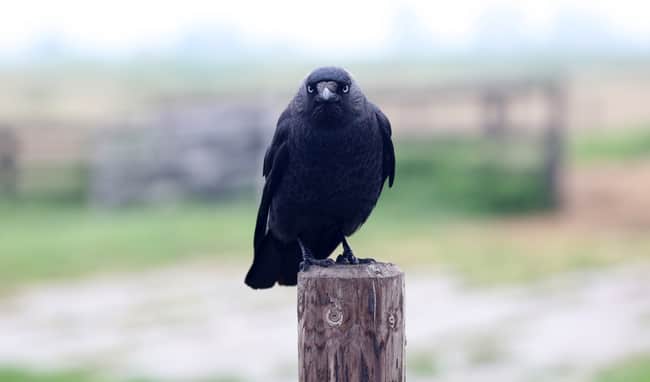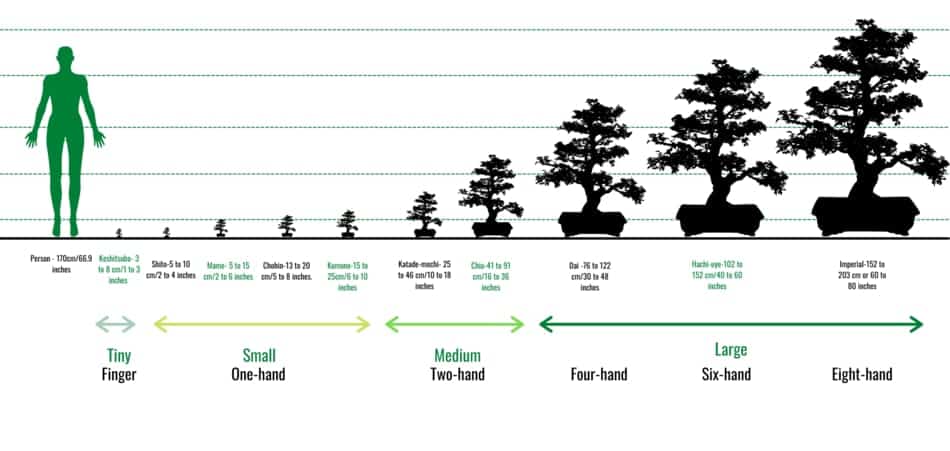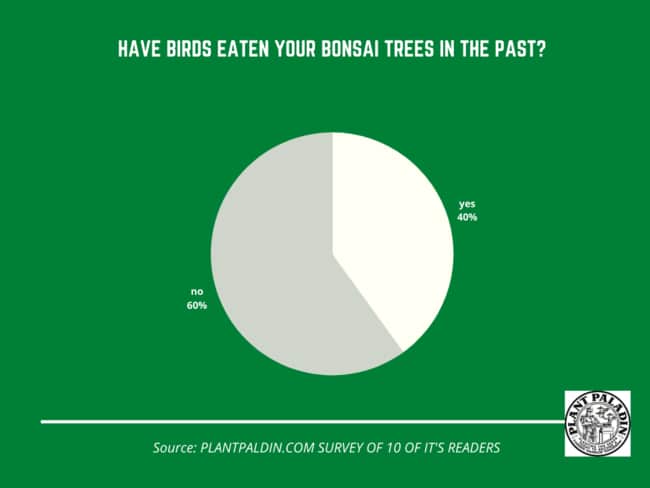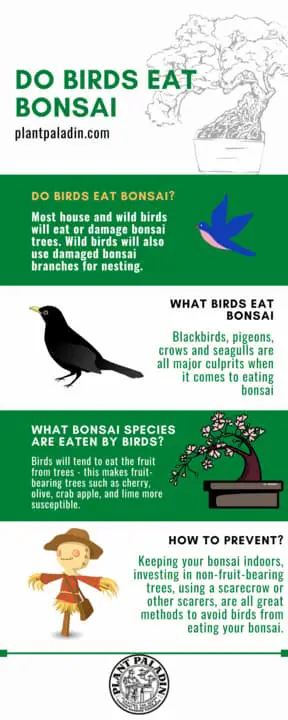This website is supported by its readers. If you click one of my links I may earn a commission. I am also a participant in the Amazon affiliates program and I will also earn a commission from qualified purchases.

Recently I visited a friend of mine who had just bought a Budgerigar – now whilst this little guy was adorable I noticed it did have a particular proclivity for attacking his house plants. This got me thinking, do birds eat bonsai trees?
Most house and wild birds will eat or damage bonsai trees. This is especially common in fruit-bearing trees such as crab apple or lemon trees. Birds will eat both the fruit and the seeds. Wild birds will also damage bonsai branches for nesting.
So why exactly do birds eat bonsai trees? And is there anything you can do to prevent birds from eating bonsai trees? Keep reading to find out more!
Just a quick heads up, over the past three years of running Plantpaladin, hundreds of people have asked for product recommendations. As such, You can find my favorite indoor bonsai tree here (link takes you to Bonsaiboy), my favorite outdoor bonsai tree (link takes you to Bonsaiboy), or have a look at all the products I recommend here.
Do birds eat bonsai trees?
Whilst most bonsai owners know the peril of letting bugs like aphids, whiteflies, spider mites, scale, and slugs attack their bonsai trees, the same is often not said about birds.
Birds you see are often a lot less common as household pets than dogs, for example, with around 20 million people owning birds in the USA when compared to around 85 million households owning dogs.
That being said, both domesticated and wild birds can cause significant damage to bonsai trees.
Now luckily I’ve visited a few garden centers and pet stores, had to deal with birds like blackbirds, crows, seagulls, and even everyday pigeons from attacking my outdoors bonsai, and even did a quick survey of plant paladin readers to get to the bottom of if birds eat bonsai trees.
Here are the results:
Do birds eat bonsai trees?
- Most wild and household birds will eat and damage bonsai trees if left unchecked.
- Birds will tend to eat the fruit from trees – this makes fruit-bearing trees such as cherry, olive, crab apple, lime, lemon, orange, plum, apple, and pomegranate more susceptible to being eaten.
- They may also eat the seeds from all types of bonsai by digging up the soil – especially if kept in an organic mix.
- Birds will also damage the branches and leaves of bonsai if kept outdoors. They will then use these branches and leaves for their nesting.
- Birds may also attack bonsai trees more when other sources of food dry up for them.
- Some tree and plant species commonly used in bonsai such as oak are poisonous to birds so you should take care not to leave these around.
How to prevent birds from eating bonsai?
So now we know that birds can sometimes eat bonsai trees, how can you prevent birds from damaging your bonsai?
Keeping your bonsai indoors, investing in non-fruit-bearing trees, using a scarecrow or other scarers, investing in ultrasonic repellers, and scenting your bonsai are all great methods to avoid birds from eating your bonsai.
Now if birds get used to feeding on your bonsai, making it become part of their daily routine, then this will prove incredibly problematic, so the main thing we are hoping to achieve with these methods is to cause a break in their daily habits.
Let’s explore these methods further.
Keep your bonsai indoors
So if you don’t own an indoor bird one of the best things you can do is just to keep your bonsai indoors.
Most bonsai species that beginners tend to use, such as Chinese elms are incredibly versatile meaning keeping them indoors for a short time won’t cause any significant damage to the tree.
Naturally, birds from the outdoors won’t be able to get inside.
Now if you are worried about the amount of light your bonsai gets indoors, (this often happens if you live in an apartment) then I’d recommend investing in something or building your bonsai greenhouse to allow you to manage all aspects of heat, light, and moisture.
Invest in non-fruit bearing trees
One of the main reasons birds eat bonsai is that they eat the fruit of some bonsai species such as plum or cherry.
A surefire way then to avoid this is just to invest in a bonsai species that does not boast tasty fruit.
For me, Junipers, elms, and pines are all fantastic species that are relatively easy to keep, without the added worry of birds eating their fruits.
Using scarers
Visit any farm and scarecrows and other scarers are an all too common sight.
Why?
Because they work incredibly well at preventing birds from eating the valuable grain and seed that makeup farmers’ livelihood.
The same goes for us bonsai owners.
Now a few scares that work best in my opinion are:
- Scarecrows
- Windchimes
- Windmills
- Toys
For a lot of birds, these will seem like other predators for birds and they may opt to stay away.
Use ultrasonic repellers
Ultrasonic repellers are a fantastic tool that lets out ultrasonic sounds that people cannot hear to help deter birds.
Birds are incredibly sensitive to sound and so applying a sound that can annoy the birds near your bonsai will fend them off.
Now if you don’t want to use ultrasonic sounds a fantastic alternative is to play recordings of predatory birds such as eagles or falcons.
Birds will think these birds of prey are in their vicinity and want to hide from them at all costs.
Scent your bonsai
Finally scenting your bonsai can work particularly well.
Scenting bonsai is an old technique that has been used to deter the likes of squirrels and other small mammals.
As birds also have very sensitive senses of smell then this can also help to deter them.
For best results then spray your bonsai with fertilizer – these often have strong smells that will put off birds.
You can also dust your bonsai with sevin.
Another great trick would also be to cover a rag soaked in vinegar in the corner of your garden and move the bonsai there.
This will create an unknown smell that will deter the birds.
Why do birds attack bonsai trees?
Birds attack and eat bonsai for a few main reasons:
- Nesting
- Food
Food
When birds have an abundance of food around such as seed from a seed feeder or loads of bugs, worms, and other foods in their diets to eat on, they will be a lot less likely to feed on your bonsai.
If however, birds have nothing to feed on then they can start being more creative in how they look for food.
Birds will very seldom pass out on a free meal.
Nesting
Birds will also attack bonsai trees for nesting.
This is more common in bonsai trees that have falling leaves or damaged dried-up shriveled branches as they are easier to plunder.
Birds need to constantly update their nests with new material to prevent them from falling apart and bonsai trees often have just the right size branches for them to use.
What birds are more likely to eat bonsai trees?
Blackbirds and crows are the bird species most common to eat bonsai trees. This is because their behavior requires them to forage for food. These birds are also strong, meaning they can often damage and eat bonsai trees relatively quickly.
Blackbirds and crows will often dig up the soil of your bonsai too whilst looking for seeds especially in fruit-bearing trees such as lime or lemon seeds.
I found then that the most common types of birds that eat bonsai trees are as follows:
- Blackbirds
- Crows
- Magpies
- Ravens
- Seagulls
- Pigeons
What bonsai trees species do birds like to eat
Fruit-bearing bonsai trees are the tree species that birds are more likely to eat. This includes cherry, plum, orange, lime, apple, crab apple, olive, and pomegranate. All of which are commonplace in bonsai horticulture.
A lot of these fruits when they decompose also leave seeds that eventually get buried in the bonsai soil.
Birds will often then dig up the topsoil to get to these.
As such you must regularly check your bonsai trees for these signs during the spring and summer months aka the fruiting season.
You may also then need to repot your bonsai or invest in a new soil mix if the damage is too great.
What part of bonsai do birds like to eat?
Birds will most often eat the fruit and seeds of a bonsai tree for sustenance. They may also eat the leaves or buds of a new tree if there is no other food available. Birds will often damage the branches of bonsai to use for their nesting.
Are bonsai trees dangerous to birds?
Now whilst we want our trees not to be eaten by birds, it’s also our responsibility as bonsai owners to ensure our bonsai trees are not causing wider harm to the ecosystem that surrounds us.
Certain bonsai trees can be especially harmful to birds including:
- Christmas Cherry
- Foxglove
- Jerusalem Cherry
- Oak
- Azalea
- Yew
I’ve put together a table below from pet coaches incredible article explaining more about this but I would also recommend having a look at my posts on:
|
Tree Species | Toxic item | Toxin |
Side effects |
| Christmas Cherry | The entire tree and fruits | Solanine, atropine-like alkaloids, saponins | Vomiting, diarrhea, rapid heart rate, difficulty swallowing, difficulty breathing, dilated pupils, no urine production, paralysis, seizure |
| Foxglove | The entire tree | Glycosides, digitalis | Vomiting, diarrhea, irregular heart rate, collapse |
| Jerusalem Cherry | The entire tree and fruits | Glycosides, digitalis | Vomiting, diarrhea, irregular heart rate, collapse |
| Oak | The entire tree | Tannis | No appetite, diarrhea |
| Azalea | The entire tree | Andromedotoxin, grayanotoxin | No appetite, diarrhea, paralysis, death |
| Yew | The entire tree | Alkaloids | No appetite, diarrhea, paralysis, death |
Do birds eat bonsai at a specific time of year?
Most birds will eat bonsai during the spring and summer months when fruit-bearing bonsai start to bloom. Blackbirds and crows however tend to feast on bonsai during the fall and winter.
As such it’s important to keep your bonsai protected from blackbirds in the winter too.
Winterizing your bonsai or building a cold frame can work wonders for this.
Do birds eat larger or smaller trees?
Birds will eat bonsai trees regardless of their size. That being said they will cause significantly more damage to a fingertip-sized bonsai than an imperial-sized bonsai and so it is important to take care of smaller bonsai at all costs.
Now I know a lot of you reading might be new to bonsai so to get an idea of the size of your bonsai tree, check out my posts on the size of bonsai tree.
Alternatively, check out the graph below:
| Classification | Size inches | Size Centimeters | Hand size | General size |
| Keshitsubo | 1 to 3 inches | 3 to 8 centimeters | Fingertip | Tiny |
| Shito | 2 to 4 inches | 5 to 10 centimeters | One-hand | Tiny |
| Mame | 2 to 6 inches | 5 to 15 centimeters | One-hand | Small |
| Chohin | 5 to 8 inches | 13 to 20 centimeters | One-hand | Small |
| Kumono | 6 to 10 inches | 15 to 25 centimeters | One-hand | Small |
| Katade-mochi | 10 to 18 inches | 25 to 46 centimeters | Two-hand | Medium |
| Chiu or Chumono | 16 to 36 inches | 41 to 91 centimeters | Two-hand | Medium |
| Dai or Omono | 30 to 48 inches | 76 to 122 centimeters | Four-hand | Large |
| Hachi-uye | 40 to 60 inches | 102 to 152 centimeters | Six-hand | Large |
| Imperial | 60 to 80 inches | 152 to 203 centimeters | Eight-hand | Large |

Any bonsai tree cuttings that you have, regardless of if they are made from large cuttings or small, may also be more vulnerable so ensure you are staying vigilant.
Birds attack and eat moss
Another key consideration a lot of you will have to know is if you keep moss on your bonsai.
Items like sphagnum moss are used for both aesthetic and moisture purposes however in the summer months birds will sometimes pick at this, either for food or to stay cool.
If you do need to use moss for your bonsai and you have a lot of birds around – I would avoid keeping the moss on the topsoil and instead plant it deep in the soil.
You will still get all the benefits of the moss but birds will not be able to see it.
This will help
What do the professionals say?
Finally, I didn’t just want to give my opinion on how to deal with birds that eat bonsai trees so I went to a few professional sources.
First I went to Birmingham Nature Centre which has an extensive bird collection and asked them if birds eat bonsai trees:
“Birds will look for nothing but an easy meal so if they see seeds or fruit laying about then they will eat them”
On a recent visit to my botanical gardens, I also asked an employee about bonsai trees and birds and this is what they said:
“Most birds will leave bonsai alone but I found the birds that do attack them, it’s mainly seeds that they are after”
Finally, I asked 10 plant paladin readers their thoughts on birds and if birds eat their bonsai trees, and here were the results:

My top picks for the gear you will need!
So like I mentioned earlier, over the past three years of running PlantPaladin, hundreds of people have asked me for my recommendations on the best bonsai gear on the market.
Having spent thousands of dollars on bonsai items these past few years and tested at least 100 bonsai-specific products, I’ve listed my favorite products below – All of which I highly recommend and think you can get great value.
They can purchase directly by clicking the link to take them to Amazon.
Bonsai Tool Set: One of the significant challenges I’ve had is finding a toolset that was not only durable but didn’t break the bank. SOLIGT has recently developed a fantastic bonsai tool set that covers all the tools you need to trim, prune, and repot your trees. – You can grab it here.
Complete Bonsai Set: Many of you will want to grow your bonsai trees entirely from scratch, but finding the varicose seeds, pots, and other items in one place can be challenging. Leaves and Sole then have created a complete bonsai set that I’ve personally used that ticks all the boxes. You can grab it here.
Bonsai wire: The number of times I’ve run out of wire for my bonsai or purchased cheap bonsai wire that doesn’t do the job is embarrassing for me to admit. After a lot of trial and error, I found that using Hotop’s aluminum bonsai wire is one of the best options on the market. This can easily be used for both indoor and outdoor bonsai. You can grab it here.
This post was written by Fehed Nicass who has been passionate about bonsai for over 2 years.

